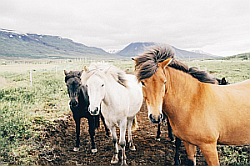Agisting horses is a great way to earn extra income if you own acreage. You allow other people to keep their horses on your property, which gives people without land the means to own their own horse. It’s a win-win situation.
Agistment may also used to support neighbouring farmers in times of hardship or draught, giving their horses and/or livestock access to additional water supplies and pastures.

Agisting horses is a great way to earn income from your acreage property especially if you love horses
I’ve decided to agist my property. What do I need to do now?
It is common for the parties involved, the horse owner and landholder, to simply have a conversation, agree to a price and shake on it. But this could leave both parties confused as to what their duties and obligations are, particularly if unforeseen issues arise.
Animals and nature are both unpredictable, and things may not always go as smoothly as you would like. Have a think about potential issues that may crop up, and agree as to how they should be addressed upfront and in writing.
For example consider:-
- What if the horse keeps getting out – whose duty is it to track down the horse and return it to the property?
- Whose job is it to maintain fences?
- What if the horse chews on, or damages, the fencing?
Protecting yourself with a written agreement that addresses any potential issues eliminates confusion and minimises the risk to yourself and your property.
What if the horse suffers injury or illness whilst at the property?
In an agreement, you can clearly set out who is responsible should the horse suffer injury, accident or illness whilst on your property.
If you allow the horse owner to access the property and/or ride on the property, you will want to make sure you are protected also, should an accident occur. In this case you may need to take out extra insurance or at least discuss the matter with your insurance provider.
In a written horse agistment agreement, you can clearly set out that the risks associated with the horse are bourne by the horse owner at all times – not you as land owner. You may also require the horse owner to take out insurance.
What if urgent veterinary assistance is needed?
Should the horse need organise urgent veterinary attention and the horse owner is unavailable, the agreement should give you the right to arrange for a vet at the horse owner’s expense. The horse owner may wish to nominate a vet.
Horse care services and extras
You may agree to provide additional services relating to the care and maintenance of the horse, such as providing daily supplementary feed, grooming, stable and bedding facilities, etc. Any additional charges for these services should also be clearly set out in your agreement, as well as detail about the additional duties that you are agreeing to undertake.
Alternatively, the agreement may be solely for use of the land, with no further obligation on the part of the land owner.
This should be clearly stated in your agreement, so you are both fully aware of what is expected of each other. This protects you from misunderstandings and liability.
Other important issues to consider when agisting horses
- Is the horse owner allowed unrestricted access to the land, or is their access limited to certain times?;
- Can the horse owner ride on the land?;
- What facilities are available? – stable, barn, feed storage areas;
- What happens if the horse gets out?;
- Maintaining safe and reliable fencing;
- Water and feed responsibilities.
What about fees?
A written agreement allows you to be clear on the fees and charges payable, and when they are due. You can specify any additional amounts are payable for extras, and whether interest will apply to overdue amounts. It gives you a signed formal agreement to rely on should things go sour.
Unpaid fees
Under an agistment agreement, you can take a lien over the horse – essentially allowing you to sell the horse to recover any outstanding fees or charges owing under the agistment agreement. This allows you to recover outstanding fees, and the balance goes to the horse owner.
What can go wrong with horse agistment?
When agisting horses, your obligations and duties should be crystal clear. By addressing potential problems both parties can feel more secure about the arrangement and be more certain that the horse will be well cared for if an unexpected event occurs.
Having a written agreement prompts you to address such issues, including those you may not have considered, and set everything down in writing. This means each party is clear on what is expected of them under the agreement, and what their duties and obligations are, avoiding confusion and potential disputes later down the track.

